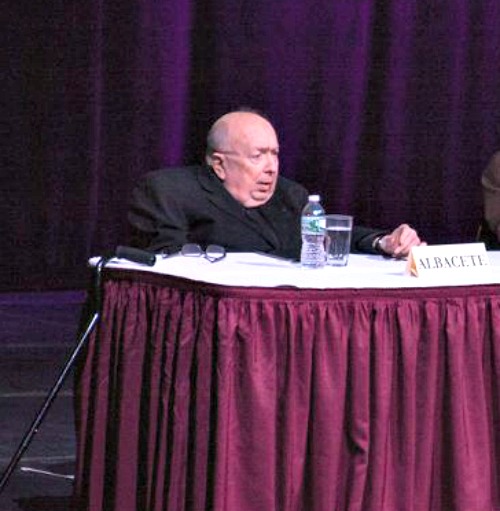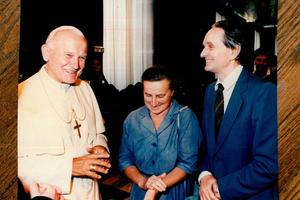Church Mourns Death of Msgr. Lorenzo Albacete, Priest and Scientist
The 73-year-old priest was the spiritual director in the United States for the Communion and Liberation movement.

NEW YORK — The Church is mourning the death of Msgr. Lorenzo Albacete, who died early Friday, following a lengthy illness; he was deeply involved in the ecclesial movement Communion and Liberation and was a good friend of Cardinal Sean O’Malley of Boston.
“Friends, I just learned of the passing of Msgr. Lorenzo Albacete, the U.S. spiritual director of the Communion and Liberation movement,” Father Robert Barron, rector of the University of St. Mary of the Lake seminary, posted on Facebook Oct. 24.
“Join me in praying for the repose of his soul. Msgr. Albacete was a gifted theologian and physicist, an outstanding spiritual guide and a model for the New Evangelization.”
Msgr. Albacete was born Jan. 7, 1941, in San Juan, Puerto Rico. He obtained a degree in physics, and after his ordination to the priesthood, he earned a doctorate in theology at the Angelicum, officially known as the Pontifical University of St. Thomas Aquinas.
He was responsible for Communion and Liberation in the U.S. and Canada and was chairman of board of advisers for Crossroads Cultural Center, a project which hosts events exploring the relationship between religion and culture.
Communion and Liberation was founded in 1954 by Father Luigi Giussani (1922-2005) in Italy. The movement’s mission, according to the CL website, is to form “its members in Christianity in order to make them co-workers in the Church’s mission in all areas of society.”
The priest was a co-founder of the John Paul II Institute for Studies on Marriage and Family in Washington and taught at St. Joseph Seminary in New York. He was rector of the Pontifical Catholic University of Puerto Rico from 1996-1997. He was also for a time an adviser to the U.S. bishops’ conference on Hispanic affairs.
Among his books are God at the Ritz: Attraction to Infinity, Priesthood and the Human Vocation, a retreat for priests, and The Sacramental Priesthood: A Gift to Humanity.
Msgr. Albacete’s writings also appeared in such places as The New Yorker, The New York Times, Tempi, Communio and Godspy, and he was interviewed by PBS and The Slate.
According to Marco Bardazzi at La Stampa, Msgr. Albacete’s “simple and clear way of ‘explaining’ Jesus Christ attracted both ordinary people (particularly those with doubts and agnostics) and prominent figures he met,” citing his discussion with Fidel Castro during St. John Paul II’s 1998 visit to Cuba.
When Castro “asked him about evangelization in the world, Father Albacete began to explain the roots of ‘the religious sense’ (referring to Father Giussani’s homonymously titled book), the importance of the human figure of Jesus and the fact that this was the reason why the pope ‘emphasized that the commitment toward and the defense of humanity is an essential element of evangelization.’ Castro was struck by the priest’s words because the priests he had met as a boy had never presented the subject to him in this way,” Bardazzi wrote.
Shortly before his death, on Oct. 10, Msgr. Albacete was visited by Cardinal O’Malley, who wrote on his blog that “it was a very moving visit with him, and we were able to pray together. I would ask all of you to keep him in your prayers because his health is very poor.”
Communion and Liberation released an Oct. 24 statement, recalling Msgr. Albacete as a man who sought “encounter with anyone, challenging the American intelligentsia with the sole weapon of his witness, as a man who had been seized and transformed by Christ in his reason and in his freedom.
“He was undoubtedly so captivating that he immediately became friends with anyone he met, because he was showing the beauty and usefulness of faith for facing life’s needs.”
The statement reflected on Msgr. Albacete’s “tireless work,” perseverance in suffering and “love of the truth that is present in every person.
“Let us all pray together and personally, that we may strive to live like he witnessed, so that we can inherit his legacy of how to follow the movement within the Church.”
- Keywords:
- catholic faith
- catholic news agency
- church movements
- communion and liberation
- ewtn news
- msgr. lorenzo albacete
- national catholic register
- spiritual direction
















